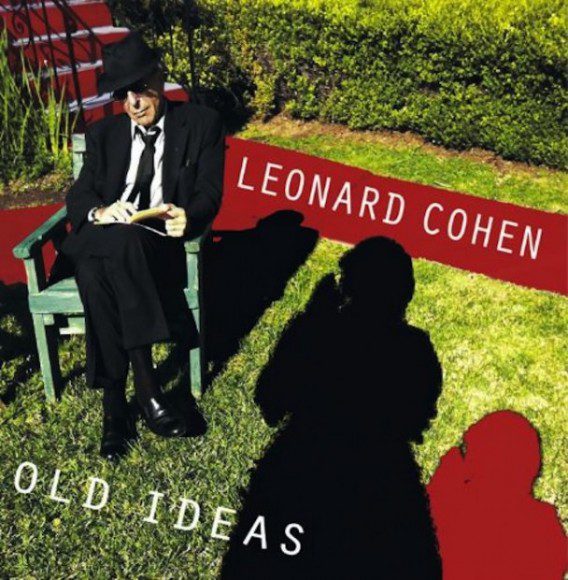Leonard Cohen: Old Ideas Review (Three Takes)
It can be difficult to gain a balanced perspective on an album after reading a single summary of the music. Bias can tilt a review, as can personal taste, history and just about everything else that is unique to the person writing it. So in an effort to offer an expanded perspective in such a medium, here are Three reactions, Three impressions, Three Takes on Old Ideas by Leonard Cohen.
Jeremy Hovda
90/10
There is something absurd about evaluating a Leonard Cohen album. The work is too singular. There are so few points of comparison with other artists in popular music. Is it good? Compared to what? Compared to the other septuagenarian Jewish-Canadian Buddhist monks who publish in the New Yorker while selling out world tours doing “folk” music? He’s definitely in that Top Ten.
Thematically and lyrically, Old Ideas is right line with the albums that built his legend in the late ’60s and early ’70s. Sonically, much less so. The beauty of those early albums was in the simplicity of Cohen’s weathered sing-speaking against spare acoustic guitar. That voice, now deeper and more roughened by age, would be even better served by the old formula. Instead, he opts for a full band with horns, electric bass, synth, archilaud, and wispy female backing vocals (which sometimes come off as a bit cheesy). The result is very close to his recent live shows.
If you were lucky enough to see his mesmerizing, three-hour performance at the Orpheum in 2009 or the filmed London show from the same tour, you know that the full band works well on stage. However, on a recording it works less well. The smooth jazz-style horns and the electric bass sound retrograde, and one can’t help but wish he would have had the guiding hand of a Rick Rubin to strip it all down à la Johnny Cash’s American Recordings.
That said, the album is a stunner. Cohen may be 77, but he’s at the top of his game. Lyrically, he has no peers. Once again, all of the big biblical themes are explored—love, hate, lust, sin, forgiveness, redemption, and, most of all, death. Each is examined from different angles and in different moods, sounding at times hopeful (“Going Home”) and others despairing (“Darkness”). Like his earlier albums, it bears many listens and will only get better with age. So if you only buy one album from someone your grandpa’s age this year, make it this one.
Jon
78/100
Despite his legendary status, I am not very familiar with Leonard Cohen’s work. I am completely clueless as to what he has been up to basically since 1998’s I’m Your Man. Staying active, it appears.
His newest record, Old Ideas, will be his third released in the 21st century. And speaking of active—despite getting old, Cohen still sounds like he’s getting around. Even if he’s now touched by the wisdom of age, to hear him sing about love, sex, and poetry . . . well, he still has the passion of a young man. Despite some instrumental changes over the years, Cohen is still singing in the same rhyme patterns and gravelly baritone croon. I don’t like that he’s often accompanied on Old Ideas by a chipper female accompaniment, but that hardly distracts from Cohen’s gravitas. For the most part I can ignore the cheesy window dressing and concentrate solely on Cohen and his carefully chosen words. I would have preferred that he just recorded the record unaccompanied by anything save the wear and tear of years gone by. But he doesn’t appear to be slowing down anytime soon, so he’s still got plenty of time for an album like that.
Tim (Vernon Wayne)
83/10
Leonard Cohen comes at you with the softest lyrical hammer on Old Ideas. Tracks like “Amen” display a careful and gentle arrangement that are at times reminiscent of the somberness of “Nobody Home” from Pink Floyd’s The Wall. This album feels more personal than that, though. “Crazy to Love You” has the mystique of a French noir film, but wouldn’t feel out of place soundtracking shots of an aged, sad-looking Bill Murray dressed in strange clothes in a Wes Anderson film. Despite this, these songs don’t feel like characterizations, but a window into Cohen’s own somber, reverent life. What we see here is a musician showing his age, but wearing it as a badge of honor.
There are points in the album, which is full of down-tempo gospel and blues-inspired folk, in which the instrumentation becomes less important that Leonard’s hypnotizing voice. It has as much character as a gnarled oak tree, but is delivered with the tenderness of a lover. Tracks like “Lullaby” float the listener down a river on a makeshift raft with a harmonica: the music pushing the album forward, Leonard stepping in only to steer you along.
Fans of Toms Waits’ quirkiness (sans circus side-show, plus cathedral gospel choir) will have a lot to look for in this record. Some songs are more up than others, others more down. But front to back, Leonard Cohen offers a deep experience to the listener. Put this record on when you want to relax, zone out, be sad, contemplate, or just sit down and listen to a story from grandpa.
Writer / co-founder













